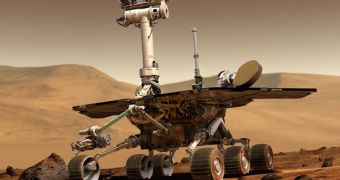When the two components of the Mars Exploration Rovers (MER) mission touched down on the surface of the Red Planet all those years ago, no one expected the two robots to last this long in the harsh conditions of their new homes. Yet, they did, and have been going so for nearly 7 years.
Spirit will turn 7 tomorrow, January 4, a day that will mark the anniversary of its 2004 landing on the surface of our neighboring planet. Opportunity arrived at Mars on January 25, so its birthday is still a few weeks away.
The reason why the accomplishments of the MER mission are so remarkable is that the rovers were originally destined to remain on Mars for a mere 90 days, or three months of observations.
However, they endured beyond this time, and eventually mission controllers at the NASA Jet Propulsion Laboratory (JPL) got used to handling the spacecraft. Now, seven years later, they are still taking care of the rovers as they were when the two explorers first landed.
But the lessons that the rover drivers learned about how to handle a robot on a distant world are priceless, experts say. The amount of troubleshooting that the JPL team had to do on the two explorers over the past seven years is remarkable.
Each of the two robots has its own particularities. For example, Spirit cannot drive during the winter, because it's located at a higher latitude than Opportunity, which can function non-stop.
Opportunity (MER-B), on the other hand, has spent a couple of years studying a number of craters and meteorites, that simply laid on the surface of the Red Planet, in its path to the large Endeavour crater.
But MER-B's main characteristic is the fact that it has been driving for a very long time, having already covered more than 26 kilometers since its 2004 landing. Its primary destination is still some miles away, but JPL experts are convinced that they will be able to get there within the next two years.
But, details aside, what makes the Martian rovers so important is the fact that they were able to restore public interest in space exploration in general, and in Mars in particular, Space reports.
“In addition to all the scientific discoveries, these rovers have made Mars a familiar place. Mars is now our neighborhood,” explains JPL MER mission manager John Callas.
“In terms of engineering accomplishments, we've set the bar so high. These vehicles are so far out of warranty, and they've traveled so far,” Washington University in St. Louis MER deputy principal investigator Ray Arvidson says.
“We were sent there under the paradigm, 'Follow the water,' to find the evidence for wet conditions. And we've done that,” he adds. Spirit has spent more than 2,500 days on Mars, whereas Opportunity is getting ready to reach the same record soon.

 14 DAY TRIAL //
14 DAY TRIAL //